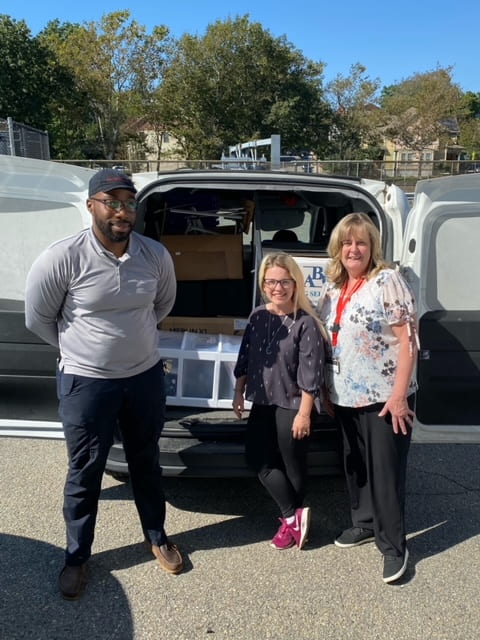The Great Exchange:
Empowering communities through office supply donation

Left to right – Prentice Cox, Amanda Lansing, Sue Higgins
By Julia Laquerre
February 16, 2024
2 2 Relocating to a new space often leaves large institutions grappling with excess materials, creating the challenge of responsibly disposing of hundreds of pounds of furniture and supplies. Unfortunately, valuable items, including boxes of staples and large desks, frequently find their way to landfills.
Sue Higgins, the Director of Materials and Recycling in the Planning, Real Estate, and Facilities (PREF) division at Northeastern University, embarked on a mission to revolutionize how departments handle surplus supplies during relocations. Her objective was to establish a sustainable method of disposal.
“We’re really trying to figure out how we can prevent these perfectly good office supplies from going to a landfill when there are other people who need them and can make use of them,” explained Higgins.
Donating not only prevents overfilling landfills but also reduces supply chain emissions by opting for second-hand furniture instead of producing new items. Annually, the furniture industry contributes 29 million metric tons of CO2eq into the atmosphere, equivalent to over three billion gallons of gasoline burned. By donating unused furniture and supplies, the university actively diminishes its carbon footprint while giving back to the local Boston community.
Higgins strongly advocates for the value of reducing and repurposing equipment, “you should reduce what you’re generating then either repurpose or repair what you can. If you can’t use it, then donate it because someone will find it useful. These are all important steps that come ahead of recycling,”
To realize this vision, Higgins collaborated with the Great Exchange, a nonprofit organization that provides schools, municipal departments, nonprofits, and other budget-restricted organizations with donated office supplies at minimal cost. Functional items in landfills can significantly benefit those with limited budgets, enabling them to acquire materials they otherwise couldn’t afford.
Amanda Lansing, the Program Administrator of the Great Exchange, emphasized the importance of offering low-priced supplies to these organizations. “A lot of the time, their budgets can be spent as soon as the fiscal year starts. By shopping here, our hope is that with those savings, their funding can be used for reinvesting in jobs and the community programs that they’re providing.”
As a large institution, Northeastern University leverages its resources to donate new and like-new products to local nonprofits like the Great Exchange. This commitment is evident in the donation of 700 pounds of office supplies by Sue Higgins, a driving force in executing Northeastern’s mission of supporting local organizations.
Lansing recognizes this effort “my personal belief is that colleges and universities really have the power to be a driving force in changing the way we look at things and advocating for other companies and universities to want to follow in their footsteps. And Northeastern is really leading the charge; it’s not just talking about these things, but actively implementing them and showing why they’re important.”
Written by Julia Laquerre 2/16/24
